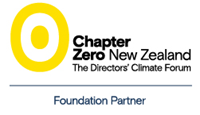Hobson Leavy – Leadership IV Series
Laurissa Cooney
Insights from Director, Laurissa Cooney CMInstD
As part of Hobson Leavy’s role as a Foundation Partner of Chapter Zero, we have spoken to several leading New Zealand directors, seeking their insights and thoughts on the climate challenge, through their experiences in the boardroom.
Interested in some of the biggest challenges facing our non-executive directors, we wanted to know what impact climate change is having on the business strategies within their portfolio, and what changes are in motion as a response.
Competing priorities are a familiar challenge for non-executive directors, but how are they balancing these priorities and putting in place tools to keep pace with the climate challenge?
Hobson Leavy discussed the climate challenge with Director, Laurissa Cooney CMInstD who provides insightful commentary from her rich governance and executive career. Laurissa’s knowledge spans a broad range of sectors including transport and logistics, tourism, property, education and professional services. She also contributes her expertise as a Co-Chair of the Aotearoa Circle and a member of the Chapter Zero Steering committee.
Greater focus on the impacts of climate change is growing among organisations and businesses are embracing and evaluating their resilience
Increased awareness on how climate change affects a business is developing among organisations and bringing a longer-term perspective to the sustainability journey. Laurissa noted that storytelling can help to bring stakeholders and teams on the journey. This can introduce a global and societal perspective to the communication on the impacts of climate change.
Businesses are also embracing and evaluating the resilience of their organisations and the longer-term considerations for the entity. An increasing focus away from the single KPI of profitability is occurring and measurable climate and other ESG targets have been introduced.
Solving the climate crisis requires leaders to be equipped and embrace climate competence to identify, evaluate and manage climate related risks
Non-executive directors must lean into developing their climate competence and ensure the right skills on the board are present to respond to climate change. Climate competence includes identifying and adopting effective board structures to ensure climate issues remain at the forefront of decision making. Fostering a culture of collective responsibility in the boardroom, including an understanding of climate science, low carbon transition across the value chain and public policy, is helpful to maintain and drive a commitment to meeting climate targets.
Responding to climate change at a governance level requires increased commitment from directors. As directors balance the climate response and other business priorities, conversations among directors are taking place with a need to rebalance their workloads in recognition of these requirements.
Laurissa praised the IoD’s Climate Change Governance Essentials course encouraging other directors to take the course, particularly as the scope of climate-related disclosure requirements for organisations continues to expand.
Biodiversity, climate adaptation and nature are considered by directors
Alongside climate targets, significant investment is being evaluated and undertaken in biodiversity and climate adaptation with resources needed to meet redefined targets and the monitoring of them. Laurissa noted that nature is increasingly being considered at the board table, including the importance of understanding and reporting on nature-related risks.
Decarbonisation remains one of our greatest challenges
The Climate Change Response (Zero Carbon) Amendment Act (2019) is a cornerstone of NZ’s climate policy, setting a framework for NZ to reach a net–zero carbon emissions target (excluding biogenic methane) by 2050. The government is expected to tighten reporting requirements as New Zealand strives to meet this target and there is a growing trend for businesses to integrate carbon reporting into their broader sustainability and ESG (environmental, social, governance) frameworks. Within the transport and logistics sectors, supply chain initiatives remain a focus to reduce carbon emissions and products and services are being analysed with a circular economy lens.
Balancing profitability and climate transition plans with shareholder and stakeholder expectations is an ongoing and growing consideration
Climate transition planning and targets are now considered along with ESG objectives. Governance questions focus on whether the company is leaning into the issues and if not, what are the short-term and longer-term consequences for the business. This is considered alongside both shareholders’ and stakeholders’ expectations, the costs to meet ESG targets and the need for returns to shareholders.
Climate response is becoming a full-board responsibility
Climate-related disclosure reporting has often sat with an Audit and Risk committee, but climate responses are increasingly becoming a full board responsibility. Other trends have seen an increase in Health and Safety committees reviewing climate related risks with respect to safe work practices. Staff in some sectors are increasingly becoming exposed to extreme weather events as a result of climate change, and human resources policies must be reviewed and updated to keep staff safe. This is an evolving process.
Executive remuneration and incentivisation to meet climate targets is developing
Executive incentives are a powerful and tangible governance mechanism for driving accountability. Integrating climate targets in executive incentives is slowly starting to feature in NZ but for many companies this is still a work in progress. One challenge in implementing climate-related incentives is the perception that some executive roles can influence climate outcomes more than others, and those executives are therefore more likely to be rewarded. However, the introduction of climate-related incentives is helping to change executives’ mindsets.
Divergent stakeholder interests and expectations around climate change
Companies are working with stakeholders and presenting longer-term strategies that address the opportunities presented by climate change, the risks of not addressing it and the wider social and environmental implications. While it might be easy for directors to get caught up in compliance, there needs to be an emphasis on strategic advantage ‘where can we win here’ with a focus on the circular economy and long-term resiliency.
The takeaways:
- Greater focus on the impacts of climate change is growing among organisations bringing a longer-term perspective to the sustainability journey
- Solving the climate crisis requires leaders to be equipped with tools and resources and embrace climate competence to identify, evaluate and manage climate-related risks
- Biodiversity, climate adaptation and nature are being considered by directors
- Decarbonisation remains one of our greatest challenges
- Balancing profitability and climate transition plans with shareholder and stakeholder expectations is an ongoing and growing consideration
- Climate response is becoming a full board responsibility, rather than that of a subcommittee
- Executive remuneration and incentivisation to meet climate targets is developing but still in its infancy
- Divergent stakeholder interests and expectations on climate change require companies to work with stakeholders and move towards an emphasis on the opportunities that the climate challenge presents which may lead to a strategic advantage
We would like to thank Laurissa for her insightful commentary and insight into this important topic, and ongoing commitment to Chapter Zero New Zealand.








